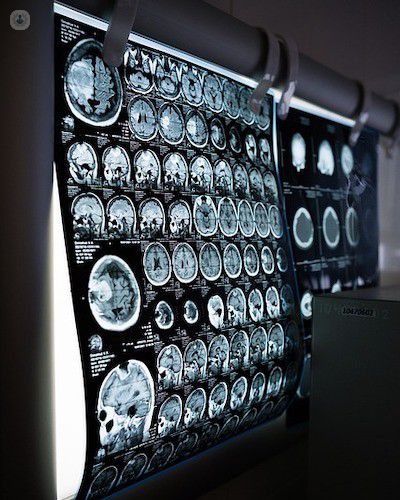Incidentally found pituitary tumours: An expert guide
Escrito por:Although some pituitary tumours are symptomatic, others are discovered only by chance when a scan of the brain is performed. In this informative article, revered consultant endocrinologist Dr Nemanja Stojanovic shares his expert insight on incidentally found pituitary tumours and their effects on the body as well as their treatment.

What is a pituitary tumour?
A pituitary tumour is a small swelling in the pituitary gland, located behind the eyes and in the front part of the brain. Tumour means 'a swelling' in Latin, so a collection of cells inside the pituitary gland is a pituitary tumour.
How are pituitary tumours diagnosed?
Sometimes, pituitary tumours are diagnosed during the investigations of visual problems such as loss of vision or loss of visual field. These tend to be larger pituitary tumours which are usually more than one centimetre in diameter.
However, quite a few pituitary tumours are found by chance on a scan of the brain performed following a head injury or to investigate some other symptoms. These tumours are known as incidentally found pituitary tumours or pituitary incidentalomas.
How is blood testing used to give more information about pituitary tumours?
In some cases, pituitary tumours may produce hormones and if this happens, signs of excessive hormone production can be observed in a blood test. Prolactin is the most frequently produced hormone by the pituitary tumours.
Excessive production of prolactin may cause symptoms. In male patients, this may relate to a swelling of the breast tissue or problems with sexual desire. Female patients may experience breast discharge or problems with periods. In other cases, pituitary tumours can produce growth hormone that will cause enlargement of the hands and nose.
While some tumours in the pituitary gland secrete hormones, others are ‘silent’ and will not cause hormone-related symptoms. Some pituitary tumours can be quite large and may suppress pituitary function due to their size. Symptoms may include, for example, a lack of periods in women of menstruating age. In a patient with an incidentally found pituitary tumour, blood testing may be helpful to examine the levels of several of hormones, including prolactin and growth hormone. Thyroid testing can also be beneficial and in some cases, levels of testosterone or the hormones which regulate fertility may need to be checked. Some patients may also require screening for cortisol excess or Cushing’s disease, if there is a clinical suspicion. This is based on the doctor’s assessment of each individual patient.
How serious are pituitary tumours?
Although pituitary tumours are very rarely cancerous, there are around one hundred and fifty pituitary cancers that have been reported in the literature thus far. Pituitary tumours which produce prolactin are easily treatable by medications which can resolve any associated issues related to fertility or periods. In cases of pituitary tumours which produce growth hormone, treatment is very important. Excessive growth hormone production predisposes patients to high blood pressure, diabetes and an increased chance of developing carcinoma of the large bowel. The same applies for the pituitary tumours that lead to excessive cortisol production Any pituitary tumour should be investigated and treated if necessary. Not all tumours require treatment and some may only require a short or prolonged period of monitoring.
How are pituitary tumours treated?
Some hormone-secreting pituitary tumours are treated with medications but others may require surgery. As well as surgery, some patients may require additional treatment such as medications or radiotherapy depending on the tumour’s size, position and the hormone it produces. Very rarely chemotherapy is required. If you require treatment for a pituitary tumour and wish to schedule a consultation with Dr Stojanovic, you can do so by visiting his Top Doctors profile.


